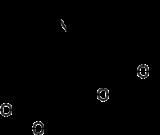
Lycorine
Encyclopedia
Lycorine is a toxic crystal
line alkaloid
found in several plant species, such as the bush lily (Clivia miniata
), Lycoris, and Narcissus. It may be highly poisonous, or even lethal, when ingested in certain quantities. Symptoms of lycorine toxicity are vomiting, diarrhea
, and convulsion
s. Regardless, it is sometimes used medicinally, a reason why some groups may harvest the very popular Clivia miniata.
It inhibits protein synthesis, and may inhibit ascorbic acid
biosynthesis
, although studies on the latter are controversial and inconclusive. Presently, it serves some interest in the study of certain yeast
s, the principal organism on which lycorine is tested.
Lycorine is also found in daffodil bulbs which are often confused with onions, thereby leading to incidents of accidental poisoning.
Crystal
A crystal or crystalline solid is a solid material whose constituent atoms, molecules, or ions are arranged in an orderly repeating pattern extending in all three spatial dimensions. The scientific study of crystals and crystal formation is known as crystallography...
line alkaloid
Alkaloid
Alkaloids are a group of naturally occurring chemical compounds that contain mostly basic nitrogen atoms. This group also includes some related compounds with neutral and even weakly acidic properties. Also some synthetic compounds of similar structure are attributed to alkaloids...
found in several plant species, such as the bush lily (Clivia miniata
Clivia miniata
Clivia miniata is a species of clivia, from South Africa. It grows to a height of about 45cm in the shade of trees and shrubs, and flowers are red, orange or yellow, with a faint, but very sweet perfume...
), Lycoris, and Narcissus. It may be highly poisonous, or even lethal, when ingested in certain quantities. Symptoms of lycorine toxicity are vomiting, diarrhea
Diarrhea
Diarrhea , also spelled diarrhoea, is the condition of having three or more loose or liquid bowel movements per day. It is a common cause of death in developing countries and the second most common cause of infant deaths worldwide. The loss of fluids through diarrhea can cause dehydration and...
, and convulsion
Convulsion
A convulsion is a medical condition where body muscles contract and relax rapidly and repeatedly, resulting in an uncontrolled shaking of the body. Because a convulsion is often a symptom of an epileptic seizure, the term convulsion is sometimes used as a synonym for seizure...
s. Regardless, it is sometimes used medicinally, a reason why some groups may harvest the very popular Clivia miniata.
It inhibits protein synthesis, and may inhibit ascorbic acid
Ascorbic acid
Ascorbic acid is a naturally occurring organic compound with antioxidant properties. It is a white solid, but impure samples can appear yellowish. It dissolves well in water to give mildly acidic solutions. Ascorbic acid is one form of vitamin C. The name is derived from a- and scorbutus , the...
biosynthesis
Biosynthesis
Biosynthesis is an enzyme-catalyzed process in cells of living organisms by which substrates are converted to more complex products. The biosynthesis process often consists of several enzymatic steps in which the product of one step is used as substrate in the following step...
, although studies on the latter are controversial and inconclusive. Presently, it serves some interest in the study of certain yeast
Yeast
Yeasts are eukaryotic micro-organisms classified in the kingdom Fungi, with 1,500 species currently described estimated to be only 1% of all fungal species. Most reproduce asexually by mitosis, and many do so by an asymmetric division process called budding...
s, the principal organism on which lycorine is tested.
Lycorine is also found in daffodil bulbs which are often confused with onions, thereby leading to incidents of accidental poisoning.

